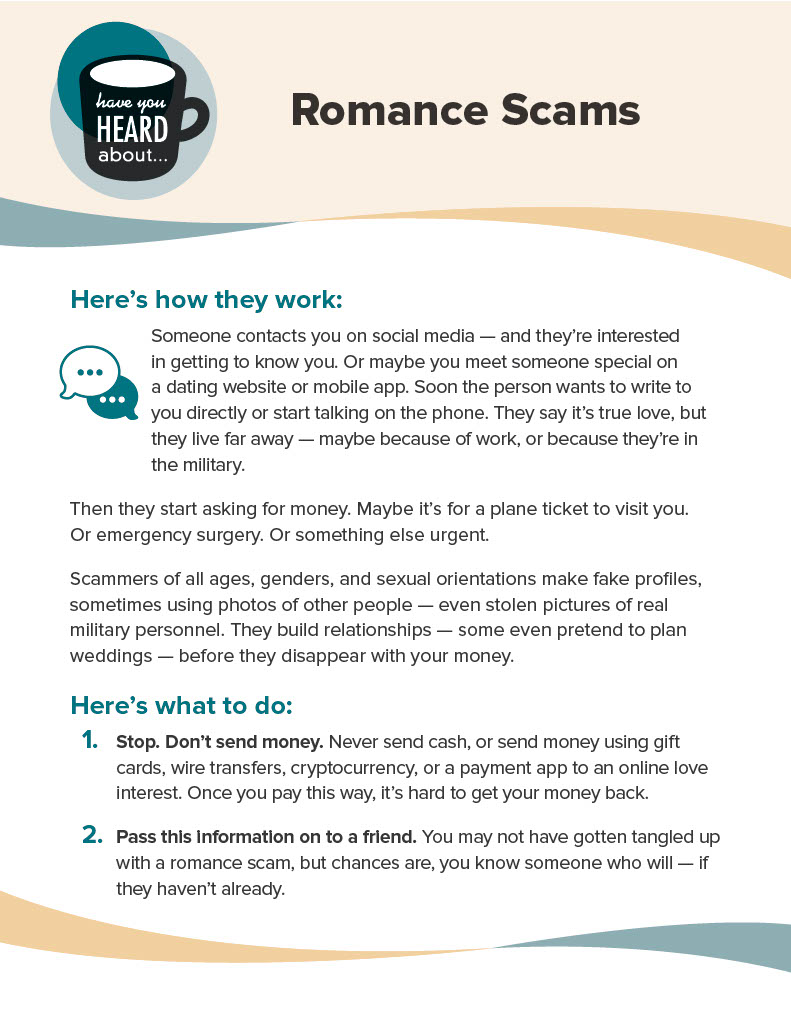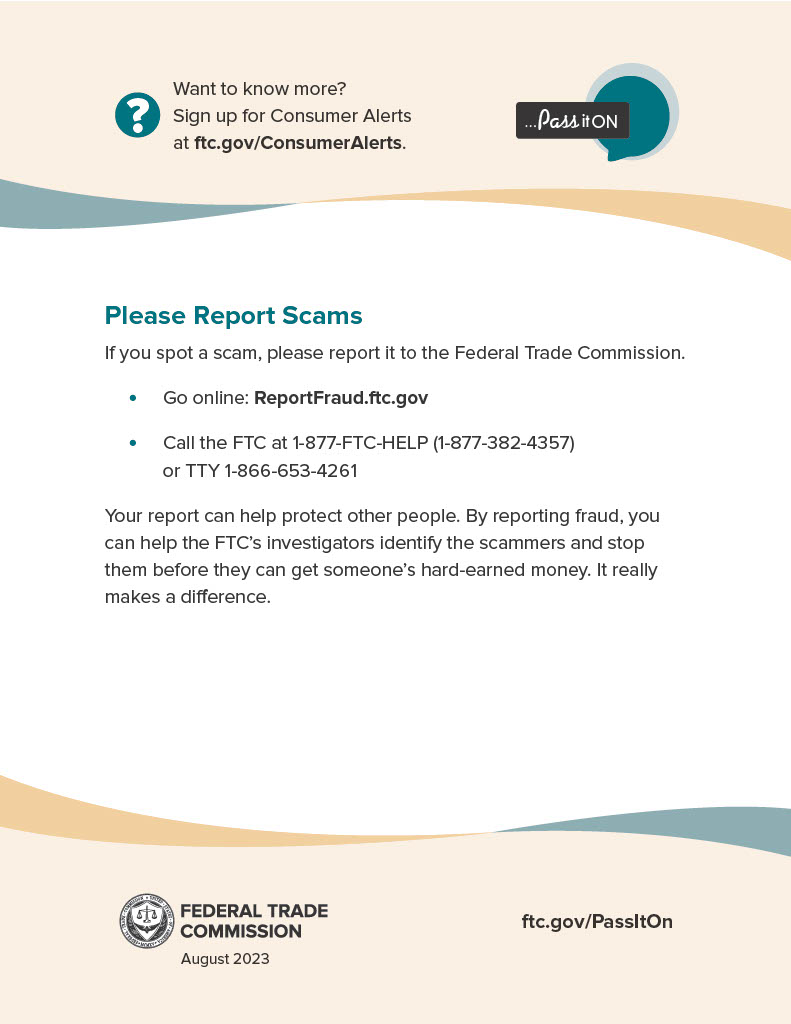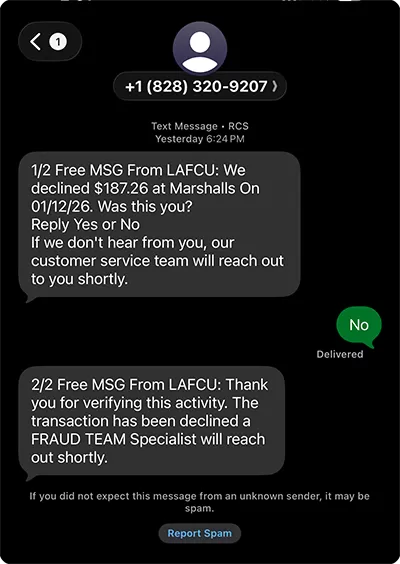Security Tips
Stay Informed, Stay Protected
Protecting your financial security is our priority. We're here to keep you updated on the latest scams, share proven strategies to safeguard your personal information, and provide the knowledge you need to stay one step ahead. LAFCU will not contact you outside of business hours.
| Type of Scam | Description |
|---|---|
| Investment Scams | Being promised quick profits through fake crypto investments. |
| Romance Scams | Being convinced to send money to an online love interest, after they’ve spent time building trust with you. |
| Phone Spoofing Scams |
|
| Employment Scams | Fraudsters pose as employers and ask for upfront payments or personal banking details. |
| Loan & Gift Card Scams | Fake funds are sent, and victims are asked to “return” them via gift cards. |
| Remote Deposit Fraud | Members are tricked into sharing online banking credentials. |
| Click & Bait Scams | Malicious texts/emails with harmful links or PDFs. |
| PC Pop-Up Scams | Fake pop-ups claiming to be Microsoft support (legitimate Microsoft support never provides phone numbers this way). |
| Inheritance Scams | Messages claiming you’ve inherited money from a distant relative or online acquaintance. |
| Red Flags | Additional Things to Look For |
|---|---|
| There is a text scam using LAFCU's name. We will not call you or text you asking for your login credentials. Do not give out your username & password, or authentication code. Don't give someone access to your account. Don't apply for a loan or a credit card for someone saying they are calling on behalf of LAFCU. Don't click on links in a text. | |
| Asking for gift cards or large cash transfers | Our name is no longer Lansing Automakers Federal Credit Union. Our legal name is LAFCU. |
| Requesting money deposits into Bitcoin ATMs | The link does NOT go to a LAFCU website and is not a secure link. A secure link will contain "https" not http. |
| Pressuring you to send funds through Cash App or other services | We'll never contact you and ask for your PIN, full card number, account number, or Online Banking/Mobile Banking login information. |
| Professing love too quickly | If you suspect a call or message could be fraudulent, simply hang up or do not reply and do not click any links. |
| Isolating you from family and friends | When dealing with text scams you may notice things such as grammatical errors or goofy looking web links. |
| Conversations typically begin over Facebook Messenger or Instagram, then a request can be made to move over to WhatsApp because it's not monitored. | Make sure you recognize the phone number the message is coming from. |
| When in doubt, take a few extra seconds to close the message, login to your account from a known website url or app. It could save you a lot of trouble! | |
| Tip | What to do |
|---|---|
| Never share | Online banking credentials, PIN, SSN, or 2FA codes with anyone. |
| Verify the caller | Hang up and call LAFCU directly if you receive suspicious calls. |
| Avoid clicking links in texts/emails | Especially from unknown senders. |
| Remember | LAFCU will never ask for passwords, 2FA codes, or facial recognition verification. |
| Tips to Protect Your Identity |
|---|
| In today's digital world, it's critical that you protect your identity; it's more than just keeping your ATM, credit and debit cards secure. There are steps you can take to help minimize risk and protect the security of your accounts and personal information. |
| Review your financial statements and monitor transactions regularly. |
| Order a free credit report at Annual Credit Report. |
| It is safer to use Bill Pay or Auto Pay than to mail checks. |
| Request that a free security freeze be placed on your credit file by contacting each of the three reporting agencies and/or contacting the FTC to receive additional information regarding security freezes. |
| Never leave your device unattended when using online financial services. |
| Lock your computer or mobile device whenever you leave it unattended. |
| Keep your devices up to date - it's important to stay current with system and browser updates to protect you from security threats. |
| Never use public information or common names or phrases, birth dates, etc. to create your password. |
| Do not reveal your password to anyone. |
| Do not accept friend requests from people you do not know on social networking sites. |
| Resource | About / Official Site |
|---|---|
| Consumer Protection | Visit FTC Consumer Protection
Federal agency enforcing consumer protection laws—tips, reporting, and scam info.
|
| Internet Crime Complaint Center | File a report with IC3
FBI & partner portal for reporting internet crime and getting resources.
|
| Romance Scam Prevention | Protect yourself from romance scams
Guidance from Homeland Security Investigations on recognizing and avoiding romance scams.
|
| Financial Crimes | Learn about financial crime
HSI overview of financial crimes they investigate and how to report.
|
| Investment Fraud Info (IC3) | IC3: Investment Fraud
IC3 information on investment/crypto fraud and how to file a complaint.
|
| Michigan Consumer Protection | Michigan AG – Consumer Complaints
State Attorney General’s page for consumer complaints and assistance.
|
| Robocalls, Unwanted Calls & Texts | Stop unwanted calls & texts
FCC guidance to block spam calls/texts and submit complaints.
|
| Mail Fraud Reporting | Report mail fraud
U.S. Postal Inspection Service form to report mail fraud.
|
1. 2.
2.
Current Scam Text Example:
This current text scam is impersonating LAFCU followed by a phone call. This is not a text message from LAFCU.

Go to main navigation
